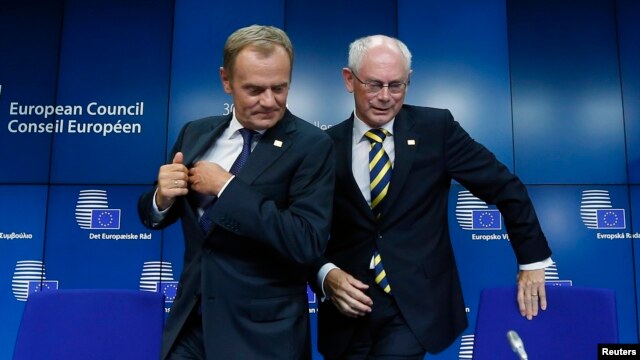EU agrees fresh sanctions against Russia
| Publisher | Radio Free Europe/Radio Liberty |
| Publication Date | 6 September 2014 |
| Cite as | Radio Free Europe/Radio Liberty, EU agrees fresh sanctions against Russia, 6 September 2014, available at: https://www.refworld.org/docid/542ac71a14.html [accessed 1 June 2023] |
| Disclaimer | This is not a UNHCR publication. UNHCR is not responsible for, nor does it necessarily endorse, its content. Any views expressed are solely those of the author or publisher and do not necessarily reflect those of UNHCR, the United Nations or its Member States. |
September 06, 2014
By RFE/RL
 Newly elected European Council President Donald Tusk (left) holds a news conference with outgoing predecessor Herman Van Rompuy during a EU summit in Brussels on August 30.
Newly elected European Council President Donald Tusk (left) holds a news conference with outgoing predecessor Herman Van Rompuy during a EU summit in Brussels on August 30.
EU officials have agreed stronger sanctions against Russia over its role in eastern Ukraine, with the measures to be implemented on September 8.
Diplomats say the fresh sanctions include an expanded list of officials under an EU travel ban and asset freeze, plus credit restrictions to Russian companies as well as an export ban on dual-use goods.
According to EU diplomats, Russia's Gazprom Bank and Gazprom Neft would fall under the new ban on raising capital in the European Union.
However, diplomats said the sanctions could be suspended if a cease-fire between Kyiv and pro-Russia rebels agreed earlier on September 5 held and if Moscow withdrew its troops from Ukraine.
The cease-fire deal was struck in the Belarussian capital, Minsk, along with a deal allowing for prisoner exchanges, deliveries of humanitarian aid and the withdrawal of heavy weapons.
Despite some initial shelling in the rebel stronghold of Donetsk after the truce began, the cease-fire appeared to be holding.
"Human life is the highest value. We must do everything possible and impossible to end the bloodshed and put an end to people's suffering," Ukrainian President Petro Poroshenko said in a statement announcing the truce, reached with representatives of Russia and the OSCE security watchdog.
The Kremlin welcomed the agreement, based largely on proposals made by President Vladimir Putin and leaving the pro-Russian separatists in control of vast swaths of territory.
At a NATO summit in Wales, U.S. President Barack Obama, who accuses Russia of arming the rebels and sending in troops to back them, reacted with skepticism to the deal.
"With respect to the cease-fire agreement, obviously we are hopeful but based on past experience also skeptical that in fact the separatists will follow through and the Russians will stop violating Ukraine's sovereignty and territorial integrity. So it has to be tested," Obama told a news conference.
Also attending the NATO summit, Poroshenko told reporters Ukraine was ready to grant a significant decentralization of power and economic freedom to the regions as well as the right to use the language of their choice and an amnesty.
A senior rebel leader said separatists still want a formal split for their mainly Russian-speaking regions. "The cease-fire does not mean the end of [our] policy to split [from Ukraine]," Igor Plotnitsky, a leader of the Luhansk region, told reporters.
Based on reporting by Reuters and AP
Link to original story on RFE/RL website
